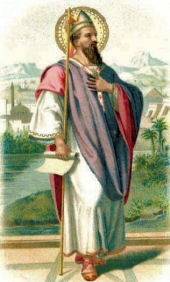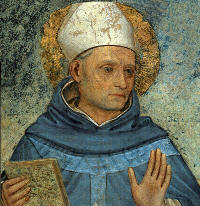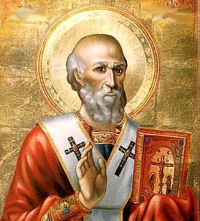Easter: May 2nd
Memorial of St. Athanasius, Bishop and Doctor of the Church
Other Commemorations: St. Antoninus, Bishop (RM)
» Enjoy our Liturgical Seasons series of e-books!
Today the Church celebrates the Memorial of St. Athanasius (295-373), Bishop of Alexandria and a great defender of the orthodox faith, throughout his life opposed the Arian heresy. By denying the Godhead of the Word the Arians turned Christ into a mere man, only higher in grace than others in the eyes of God. St. Athanasius took part in the Council of Nicea in 325 and until the end remained a champion of the faith as it was defined by the Council. In him the Church venerates one of her great Doctors. He was subjected to persecutions for upholding the true teaching concerning the person of Christ and was sent into exile from his see no less than five times. He died at Alexandria in 373 after an episcopate of forty-six years.
The Roman Martyrology commemorates St. Antoninus (1389-1459), Bishop of Florence, and a member of the Dominican Order. In the exercise of his pastoral charge he showed great charity. He died in 1459.
Meditation for Friday of the Second Week of Easter
The Sacrament of Penance
1. "At that time, when it was late that same day [Easter Sunday], the first of the week, and the doors were shut, where the disciples were gathered together for fear of the Jews, Jesus came, and stood in the midst, and said to them: Peace be to you. And when He had said this, He showed them His hands and His side. The disciples therefore were glad when they saw the Lord. He said therefore to them again: Peace be to you. As the Father hath sent Me, I also send you. When He had said this, He breathed on them, and He said to them: Receive ye the Holy Ghost; whose sins you shall forgive, they are forgiven them, and whose sins you shall retain, they are retained."
The sacrament of penance is the gift of the risen Christ to Ho Church, St. Jerome calls it a "second plank after our ship wreck," and Tertullian refers to it as "an arduous baptism." It is a marvelous means of salvation for those baptized.
2. "Whose sins you shall forgive, they are forgiven them." Christ sacrificed even His life for the salvation of men. Could He have done more for us? Should not the remembrance of the crucified One and the memory of His death for us inspire us with so great a love that we could never sin again? We have, moreover, the strength and the grace provided by the Eucharist, through which He gives Himself to us for the nourishment of our souls. Does not the Eucharist have the power to sanctify us so that we can overcome all sin, so that sin can no longer have any part in us? But Christ, knowing the weakness and the wickedness of men, approaches His Church on Easter might and provides her with yet another means for the remission of sin, for the healing of the wounds caused by sin, and for strengthening us against sin. He gives us the sacrament of forgiveness, of mercy, of reconciliation, a means whereby we may regain peace with God and with ourselves. "Peace be to you." This holy sacrament is His Easter greeting to His apostles, to His Church, and to us. He thus provides a new proof of His love and solicitude for us. He wishes to enrich us with grace and grant us forgiveness, even when we have been unfaithful.
"Peace be to you." He sets no limits to the number of times we may receive this sacrament, for He knows only too well our weakness and our instability. Neither does He set any limit on His mercy in this sacrament. There is no sin, however frightful, which cannot be forgiven. Even venial sins and the daily minor failings of which we are guilty, are matter for this sacrament. "Whose sins you shall forgive, they are forgiven them." Christ's mercy in giving us this sacrament shows us how concerned He is that we become incorporated in Him through baptism and the Eucharist. He wills that we be free from all sin and live as pure children of God. He desires that we begin a new life, free of all sin or infidelity to the Father. Would that we might carry out His designs!
Not only are the various mortal sins which we commit forgiven and destroyed by this sacrament, but also our venial sins and faults. Christ wills that through baptism and the Eucharist we become so firmly implanted in Him that we are freed from all sin and become children of God. He wills that we begin to live a new life that will be free from the slightest fault, and avoid even the smallest infidelity to His Heavenly Father. It is for this reason that the Church insists that all those who dedicate themselves to the quest of perfection such as priests and religious, receive this sacrament and its graces every week. She looks upon the "frequent" reception of this sacrament as an excellent means of acquiring Christian perfection. "By it genuine self-knowledge is increased, Christian humility grows, bad habits are corrected, spiritual neglect and tepidity are resisted, the conscience is purified, the will is strengthened, a salutary self-control is attained, and grace is increased in virtue of the Sacrament itself" (Pius XII, Encyclical, Mystici Corporis, Part III, 88). If the Sacrament can accomplish all these things for us, how zealously we should use it.
3. We acknowledge with gratitude and faith the precious Easter gift which the Lord has given us in the sacrament of penance. We recognize the apostles and their successors, the bishops and priests, as having the commission and the power to forgive or retain our sins. They are, therefore, placed over us as judges of our conscience. Because of these Easter gifts we subject ourselves in obedience and with confidence to the priests who have been placed over us. From them we seek and receive the forgiveness of our faults.
Since the Lord receives us in the sacrament of His mercy with so much love and solicitude, it is fitting that we respond to His advances with a like generosity. Knowing the importance and the efficacy of this sacrament, we should be eager to use it for the salvation of our soul and the enrichment of our spiritual life.
—Benedict Baur, OSB, The Light of the World, Vol. 2.
St. Athanasius
 A champion of orthodoxy! He did not die a martyr, but his life was martyrdom in the truest sense. Athanasius was the Church's greatest hero in the battle against Arianism (a heresy that denied Christ's divinity). Even as a young deacon at the Council of Nicea (325), he was recognized as "Arius' ablest enemy" and the foremost defender of the Church's faith. After the death of his bishop (328), "the entire Catholic congregation with one accord, as one soul and body, voiced the wish of the dying bishop Alexander that Athanasius should succeed him. Everyone esteemed him as a virtuous, holy man, an ascetic, a true bishop."
A champion of orthodoxy! He did not die a martyr, but his life was martyrdom in the truest sense. Athanasius was the Church's greatest hero in the battle against Arianism (a heresy that denied Christ's divinity). Even as a young deacon at the Council of Nicea (325), he was recognized as "Arius' ablest enemy" and the foremost defender of the Church's faith. After the death of his bishop (328), "the entire Catholic congregation with one accord, as one soul and body, voiced the wish of the dying bishop Alexander that Athanasius should succeed him. Everyone esteemed him as a virtuous, holy man, an ascetic, a true bishop."
There followed fifty years of constant conflict. Under five emperors and by exile on five different occasions, he gave testimony to the truth of the Catholic position. His allegiance to the Church never wavered, his courage never weakened. As consolation in the face of horrendous calumnies and cruel persecution, Athanasius looked to the unwavering love of his Catholic people. Even time brought no mitigation in Arian hatred. For five years he hid in a deep, dry cistern to be safe from their raging wrath and their attempts to assassinate him. The place was known only to one trusted friend who secretly supplied necessary food.
That Athanasius enjoyed God's special protection should have been obvious to all. On one occasion when the emperor's assassins were pursuing him, Athanasius ordered the ship on which he was fleeing to double-back and sail upstream so that he might meet and by-pass his persecutors. Not recognizing the boat upon meeting in semi-darkness, they naively asked whether the ship carrying Athanasius was still far ahead. Calmly and truthfully Athanasius himself called back, "He is not far from here." So his persecutors kept sailing on in the same direction, allowing the saint to complete his escape.
Preserved by divine Providence through a lifetime of trial and danger, he finally died in his own quarters at Alexandria during the reign of the Emperor Valens (373). Athanasius enriched Christian literature with many important works, some pointed toward piety and edification, others polemical and dogmatic in nature. He ruled the Church of Alexandria for forty-six years.
—Excerpted from The Church's Year of Grace, Pius Parsch
Symbols and Representation: open book; two columns; boat on the Nile; equilateral triangle; open book between two Greek Doric columns; archbishop's pallium; scroll with quotation from his writings.
Often Portrayed As: Bishop arguing with a pagan; bishop holding an open book; bishop standing over a defeated heretic
Patronage: Bellante, Italy
Highlights and Things to Do:
- Find out more about St. Athanasius:
- Read more about the Athanasian Creed.
- The Catholic Culture podcasts have several recordings on the life of Athanasius and his writings.
- If you are feeling academic you might like to read Ecclesiastical History by Salaminius Hermias Sozomenus.
- Catholic Culture's library also has many writings of St. Athanasius:
- Watch this excellent EWTN video on St. Athanasius of Alexandria.
- Read Select Treatises of St. Athanasius translated by John Henry Newman here.
- Purchase a copy of On the Incarnation by St. Athanasius.
- See his statue on the St. Peter's Colonnade.
- St. Athanasius was originally buried in Alexandria, but his remains were later transferred to the Chiesa di San Zaccaria in Venice, Italy. In 1973, Pope Paul VI gave the Coptic Patriarch a relic of Athanasius, which is currently preserved in the St. Mark's Coptic Orthodox Cathedral in Cairo, Egypt. See Saints in Rome.
St. Antoninus
 He wanted to join the Dominicans, but he was so small he scarcely reached above the tabletop in the office of Blessed John Dominici, the Dominican prior of Santa Maria Novella in Florence. To put him off, the prior told him to go home and memorize the Decrees of Gratian, a compilation of Church law. Within a year, the boy had returned, had committed the decrees to memory, and was given the habit of a Dominican.
He wanted to join the Dominicans, but he was so small he scarcely reached above the tabletop in the office of Blessed John Dominici, the Dominican prior of Santa Maria Novella in Florence. To put him off, the prior told him to go home and memorize the Decrees of Gratian, a compilation of Church law. Within a year, the boy had returned, had committed the decrees to memory, and was given the habit of a Dominican.
St. Antoninus was one of the first novices at Fiesole, which Blessed John had built, and among his fellow novices was the future artist Fra Angelico. After his ordination to the priesthood, Antoninus was made prior at Rome, Gaeta, Siena, Fiesole, and finally at Florence where he founded the famous Convento di San Marco, where Fra Angelico did some of his most memorable work.
He was summoned by Pope Eugene IV to take part in the Council of Florence in 1438, and as prior of San Marco, welcomed many of the prelates and scholars to Florence for the sessions of the council that took place there. It was at this time also that the great library of San Marco was opened to the public.
In 1446, much against his will, he was appointed archbishop of Florence but continued to live as a simple Dominican friar. Then, he became a veritable dynamo of activity: he rebuilt churches, visited parishes, preached incessantly, and brought about peace between political factions and religious orders. He was in Rome at the deathbed of Pope Eugene IV and was consulted by succeeding pontiffs in the reform of the papal curia. He was a superb theologian, his writings on moral theology and economics are considered pioneer works in the changing society of his times.
Shortly before the death of Antoninus, a plague hit Florence, decimating the city, with many of his friars dying, and the people starving from famine. He sold everything to help the hungry and destitute. When a violent earthquake hit Florence, he helped to rebuild the city, housing some of the victims in his own home. He died on May 2, 1459, and Pope Pius II himself came to attend his funeral. The people of Florence, who loved Antoninus, placed his statue in the Uffizi Palace, the city's hall of fame.
—Excerpted from The One Year Book of Saints by Rev. Clifford Stevens
Patronage: against fever; Filicaja, Italy; Moncalvo, Turin, Italy; University of Santo Tomas Graduate School, Manila, Philippines; Saint Antoninus Parish, Municipality of Pura, Tarlac Philippines
Symbols and Representation: Lily; pair of scales in which he weighs false merchandise against God's word; scales; wearing bishop's mitre, holding the cross, and giving the sign of blessing in absolution
Highlights and Things to Do:
- Read more about St. Antoninus:
- St. Antoninus' body lies in the Chapel of St. Antoninus in the Church of San Marco, Florence, Italy.
- St. Antoninus was noted for his love of people: people of all kinds, from those in high places to the poorest of the city. To help the poor, he organized the Men of St. Martin, who exist to this day.






